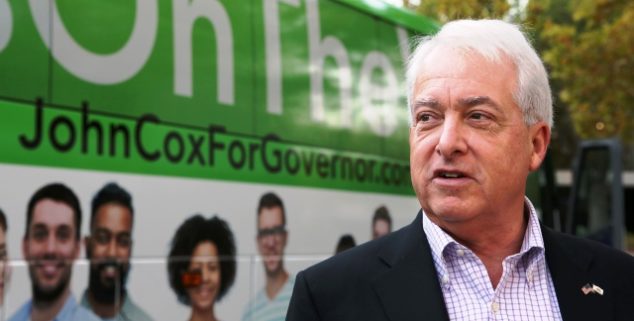News
John Cox: A tough slog toward the governorship
 Republican candidate for governor John Cox talks to reporters before launching a statewide bus tour in Sacramento. (Photo: AP/Rich Pedroncelli)
Republican candidate for governor John Cox talks to reporters before launching a statewide bus tour in Sacramento. (Photo: AP/Rich Pedroncelli)Republican John Cox, running for governor, wants you to realize a few things.
California has the highest poverty rate in the nation.
Our schools are failing.
Millions of forgotten Californians cannot afford decent housing.
Millions more must choose between buying a half-tank of gas or groceries for their families.
And all of this happened on Gavin Newsom’s watch.
But “Help is on the Way,” Cox says, echoing Democrat John Kerry’s 2004 presidential campaign mantra.
Cox is a lawyer, certified public accountant and venture capitalist whose net worth is said to exceed $200 million. He is the founder of Equity Property Management and Cox Financial Group Limited.
Republican Cox and Democrat opponent Newsom may not agree on much, but they have at least five things in common: Both are divorced from their first wives, both have four children, both were raised for a time by a single mother, both engaged in athletics to help pay for college and both are multimillionaires.
Cox has had a very successful career in business. In politics, not so much.
He put himself through college by teaching tennis and earned his degree from the University of Illinois at Chicago, where he majored in accounting and political science. He received his juris doctor degree from Chicago-Kent College of Law at Illinois Institute of Technology at night while working at Coopers & Lybrand as an accountant during the day. (Newsom attended Santa Clara University on a partial baseball scholarship.)
Cox is a lawyer, certified public accountant and venture capitalist whose net worth is said to exceed $200 million. He is the founder of Equity Property Management and Cox Financial Group Limited.
Cox’s political career, however, has been a series of failures.
In 2000, Cox ran for Congress in Illinois’s 10th congressional district to replace retiring Rep. John Edward Porter. He lost the Republican primary race to former Porter aide Mark Kirk.
In 2002, Cox ran for U.S. Senate in Illinois on a conservative platform, aligning himself with Reagan Republicans. He lost the Republican primary to Jim Durkin. Cox later served as president of the Cook County, Illinois, Republican Party.
In 2004, Cox garnered 41.43 percent of the votes in losing against longtime incumbent Democrat Eugene Moore in the Cook County Recorder of Deeds race. Cox said he decided to run for the office in order to eliminate the position; he saw the office as an unnecessary duplication of services.
Looking way ahead, Cox on March 9, 2006, announced his candidacy for the Republican nomination for U.S. president in 2008. He thus became the first Republican to formally enter the 2008 presidential race. He dropped out of the race later in the year, but did appear on several primary ballots.
Cox, an Illinois native, became a part-time resident of California in 2007, and in 2011 he became a full-time resident of Rancho Santa Fe in San Diego County.
On March 7, 2017, Cox announced his candidacy for governor of California in the 2018 election. He fell just short (55 percent) of gaining the necessary 60 percent to win the Republican Party endorsement at the spring 2018 convention.
Cox’s policy positions are for the most part conventional Republican. He boasts that he is a lifetime member of the National Rifle Association. He is endorsed by Donald Trump, who says Cox will “Make California Great Again.” He opposes abortion. Cox also maintains that there is no constitutional provision for the separation of church and state.
Cox has also been endorsed by eight Republican members of Congress, including House Majority Leader Kevin McCarthy, Devin Nunes, Jeff Denham and Mimi Walters.
Cox, an Illinois native, became a part-time resident of California in 2007, and in 2011 he became a full-time resident of Rancho Santa Fe in San Diego County.
Cox does have the ability to occasionally stand out from conventional politicians. In 2016, he proposed a ballot initiative that would require legislators to wear—like NASCAR drivers—the logos of their top 10 donors on their suits when advocating for policies on the Senate or Assembly floor. The proposal failed to qualify for the ballot.
He faces a tough slog.
The Public Policy Institute of California reported on Oct. 24 that Newson led Cox by 11 points in its latest survey—49 percent to 38 percent, with 10 percent undecided. Those numbers however, were narrowly better for Cox than PPIC’s numbers the month before, when Newsom had a 12-point lead, and far better than July, when Newsom had 24-point lead.
Moreover, Cox faces a stunning disadvantage in party registration.
Of California’s 19 million registered voters, 8.3 million (43.8 percent) are Democrats, while Republicans can claim only 4.6 million (24.5 percent) of registered voters, falling below the 51 million (26.8 percent) decline-to-state registrants. On top of that, all current statewide officeholders are Democrats.
Cox is pinning hopes on Proposition 6, the campaign to repeal the state’s gas tax approved last year to fund road repairs and public transportation. He hopes that the repeal campaign will fire up enough Republican voters that the Cox campaign will punch above its weight and win. The Oct. 24 PPIC survey, however, showed the Proposition 6 repeal appeared to be going down, with 48 percent opposing the measure, 41 percent in support and 11 percent undecided.
An uphill slog, indeed.
Want to see more stories like this? Sign up for The Roundup, the free daily newsletter about California politics from the editors of Capitol Weekly. Stay up to date on the news you need to know.
Sign up below, then look for a confirmation email in your inbox.

Leave a Reply